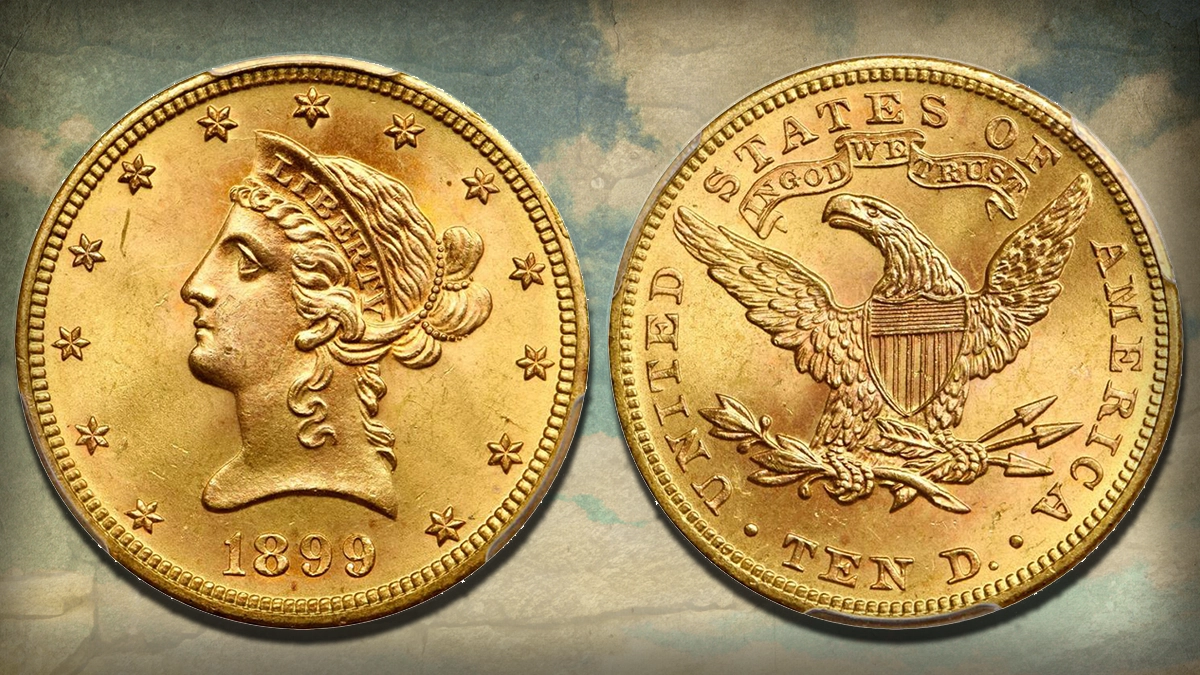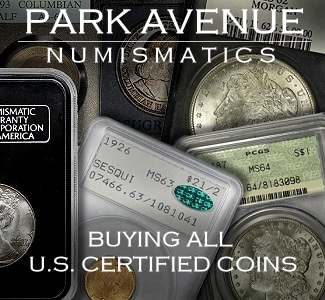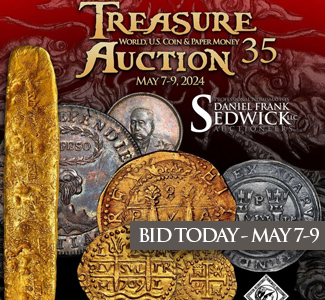
By Charles Morgan and Hubert Walker for CoinWeek Notes …..
The $10 gold eagle was the largest denomination coin authorized by the Mint Act of 1792, but an unfavorable silver-to-gold ratio meant that gold coins were worth more silver in Europe than in the United States. Thus, many gold eagles were exported to Europe, where they were melted and recoined. Those that remained in this country were hoarded, so few eagles were used in commerce until a weight reduction in the late 1830s removed the money broker’s incentive to melt the coins to reclaim the metal.
At this time, eagles again appeared in circulation, but the start of the Civil War in 1861 caused all United States coins to vanish from daily use. Americans, unsure about the length of the conflict or its outcome, hoarded copper, silver, and gold coins. The government responded by issuing fractional currency notes and greenbacks. Despite this, the Philadelphia Mint and the San Francisco Mint continued to strike coins.
From the horrors of the war grew a fervent religious sentiment in the North, and in a letter to Treasury Secretary Salmon P. Chase, Pennsylvania minister M.R. Watkinson proposed recognizing the nation’s faith in God on U.S. coinage. Chase approved the idea, and in short order, the motto IN GOD WE TRUST first appeared on the newly introduced Two-Cent Piece. The Coinage Act of 1865 expanded the use of that motto on the nation’s silver and gold coins. In 1866, United States Mint Chief Engraver James Barton Longacre added the motto on the reverse of the Liberty Head Eagle, placing it on a furled banner above the eagle’s head.
Eagle Languishes Despite Massive Gold Coin Production
Gold coins in general continued to be hoarded until well into the 1870s. On January 14, 1875, Congress enacted the Specie Payment Resumption Act, which restored the nation to the gold standard. This Act prompted the more regular use of silver and gold coins, but by this time the $10 Liberty Head Eagle was supplanted by the $20 Liberty Head Double Eagle as the primary gold coin for domestic banking and international trade.
The total number of Liberty Head Eagles minted each year for the first decade was small by comparison, and not until 1879 did the combined production from all mints in any one year exceed half a million coins. For several years after 1879, eagle mintages exceeded one million coins, although, for many years, the total from individual mints often was less than 100,000 pieces.
With Motto Liberty Head Eagles were minted in Philadelphia (all years), San Francisco (all years except 1875, 1890, 1891, and 1904), Carson City (1870-1884, 1890-1893), New Orleans (1879-1883, 1888, 1892-1895, 1897, 1899, 1901, 1903-1904, 1906), and Denver (1906-1907). Branch mint S, CC, O, and D mintmarks are on the reverse, below the eagle and above TEN D.
How Much Are Liberty Head Eagles With Motto Worth?
Collectors will likely notice that Liberty Head Eagles With Motto produced from 1866 through 1879 are generally more expensive than those from 1880 through 1907, even at lower grades.
Few Mint State and finer coins from this early period have been certified, and Mint State coins for some issues see dramatic jumps in price the higher they fall in the Mint State range.
Coins dated 1880 and later are relatively affordable up to grades of near-Gem, except for most Carson City and some New Orleans and San Francisco issues, which are typically priced higher. Virtually all near-Gem and Gem coins from this period are expensive, as is the 1873 Closed 3 variety.
The key dates of this type include 1870-CC, 1875, 1877-CC, 1878-CC, 1879-CC, and 1883-O, all of which are scarce to rare.
Some Prooflike circulation strikes have been certified, and the state of preservation of these coins will vary. Some are very baggy, while others are mirrorlike and attractive.
Given the size of the coin-collecting market at the time these coins were produced and the cost of collecting $10 gold coins, only a small number of gold Proofs were struck each year. Most of the surviving examples have been certified, and all of them are expensive. Some exhibit various degrees of Cameo frost.
Varieties
Varieties of the Liberty Head Eagle With Motto exist, but none are listed in the Red Book. Collectors focus on the 1873 Closed 3 for both business and Proof issues. For the specialist collector, 150 minor design changes, die variations, and repunches–some very rare–have been cataloged.
Date-by-Date Analysis of the With Motto Liberty Head Eagle
Extended Coverage on CoinWeek
- So You’ve Decided to Collect With Motto Liberty Head Eagles…
- Assembling A Year Set of Liberty Head Eagles, Part Two: 1867-1907
- San Francisco Liberty Head Eagles 1854-1878: A Date-by-Date Analysis
- Three Under-appreciated With Motto San Francisco Liberty Head Eagles
- The Million-Dollar Liberty Head Eagle
CoinWeek contributor and U.S. gold coin specialist Doug Winter has written several articles on With Motto Liberty Head $10 Gold Eagles, offering tips to collectors and market analysis.
Design
Obverse:
On the obverse of the coin, a classical rendition of Liberty faces to the left, hair bundled at the back and secured with a beaded tie, but with two strands of hair cascading down the neck to the back and the side. The word LIBERTY stretches across a coronet resting above her forehead. Thirteen six-point stars encircle just inside a denticled rim, broken only by the date centered at the bottom.
Reverse:
A left-facing eagle is in the middle of the reverse, wings outstretched with a Union shield across the breast. Three arrows are clutched in the viewer’s right claw, and an olive branch is held in the viewer’s left claw. UNITED STATES OF AMERICA circles inside a denticled rim, broken into three parts by the eagle’s wing tips. A flowing banner with the words IN GOD WE TRUST appears in the space above the eagle’s head, below STATES OF. The denomination TEN D. is at the bottom, separated from the legend by a centered dot to the left and to the right.
Coin Specifications
| Liberty Head Eagle, With Motto | |
| Years Of Issue: | 1866-1907 |
| Mintage (Business Strike): | High: 3,877,220 (1881); Low: 20 (1875) |
| Mintage (Proof): | High: 120 (1900); Low: 100 (1874, 1875, 1877, and 1878) |
| Alloy: | 90% gold, 10% copper |
| Weight: | 16.72 g |
| Diameter: | 27.00 mm |
| Edge: | Reeded |
| OBV Designer: | Christian Gobrecht |
| REV Designer: | Christian Gobrecht (James Longacre added motto in 1866) |
* * *
References
Bowers, Q. David. The Experts Guide to Collecting & Investing in Rare Coins. Whitman Publishing.
–. A Guide Book of United States Type Coins. Whitman Publishing.
Breen, Walter. Walter Breen’s Encyclopedia of U.S. Coins. Doubleday.
Guth, Ron, and Jeff Garrett. United States Coinage: A Study by Type. Whitman Publishing.
–. Encyclopedia of U.S. Gold Coins: 1795-1933. Whitman Publishing.
Taxay, Don. The U.S. Mint and Coinage. Arco Publishing.
Yeoman, R.S. and Jeff Garrett (editor). The Official Red Book: A Guide Book of United States Coins. Whitman Publishing.
* * *




